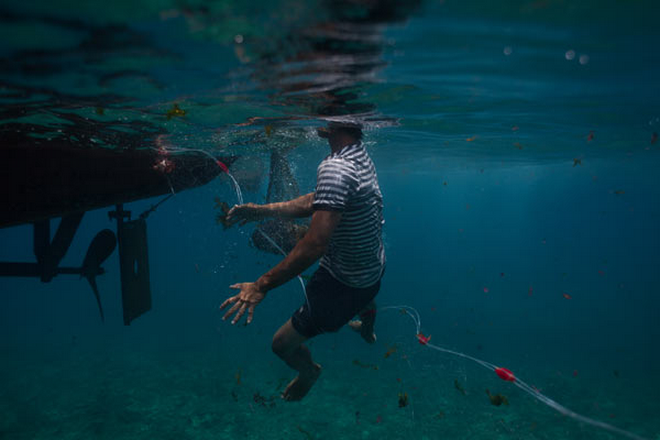
Photo Essay: Geopolitical pawns, the fishermen of Lý Sơn, Vietnam
for Mongabay(For full story and photo essay click here)
The island of Lý Sơn sits a few miles off shore of the city of Da Nang and halfway down the long, serpentine coast of Vietnam. Most of its people are simple fishermen, trolling the South China Sea for octopus, shrimp and whatever fish they can catch.
It’s a tiny isle, rarely visited by tourists and nowhere near China. Yet, these fishermen now find themselves caught in an international dispute between their country and Asia’s dominant nation.
China — in a grab for regional power and vital sources of protein and potentially oil — has claimed ownership of most of the ocean stretching between Hong Kong, Malaysia and the Philippines. This vast, poorly defined area covers about 90 percent of the 1.35 million square mile (3.5 million square kilometer) South China Sea. It includes 10 percent of global fisheries and accounts for $5 trillion in annual shipping. Laying claim to that much ocean is comparable to the U.S. alleging its sovereignty over the entire Gulf coast of Mexico into Central America.
China first claimed the South China Sea, labeling it the “nine-dotted line” on a 1947 map, possibly in response to the power vacuum created by Japan’s surrender two years earlier. Their claim conflicts with those of Vietnam, Taiwan, Malaysia, the Philippines and Brunei.
While maritime lawyers say China’s “nine-dotted line” has little legal basis under international law, it is backed by military muscle. Here on Lý Sơn, fishermen confronted by China’s ban on their traditional fishing grounds can no longer safely go more than a couple hundred miles out to sea, so are depleting the shoals around Vietnam’s coast.
To see the effects firsthand, we swam out to visit a fishing boat working just off another nearby island. The fishermen, working from traditional teacup-shaped boats tethered to a larger vessel, said it had been a disappointing day. One of many in recent years.
The coastal reefs that once teemed with life were desolate. The fishermen said that there were just too many boats trying to scrape a living from depleted grounds close to shore. But they certainly weren’t about to risk going farther out to sea.
Their caution is warranted. If, like 46-year-old Nguyên Phú, they venture too deeply into Vietnam’s claimed territorial waters, a Chinese patrol boat will swoop down on them. One such patrol, says Phú, captured him and his crew early one morning, impounded his boat and imprisoned them for a month. He endured daily beatings.
“When they came, what could we do?” he asks, crouching down like a frog with his hands above his head. “We just put our hands up like this, and said, ‘Don’t shoot! Don’t shoot!'”
Phú isn’t the only victim. Other fishermen imprisoned in anticipation of an unknown fate, wait stoically. Some write poetry. For his part, Phú passed the days by carving a tattoo into his arm. It reads: “Love your neighbors. Get revenge on your enemies.”